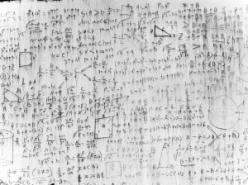UA preparatory math goes virtual

The University of Arizona's math department is experimenting with a novel approach to early math instruction – one with a heavy emphasis on technology and peer-to-peer tutoring.
Arguably, few other required college-level courses elicit the same frustration or the intimidation factor as mathematics.
Some commonly talk about holding a hatred for math, believe they are no good at it or think up strategies to avoid it all together.
But one University of Arizona team is working to unravel the enigmatic nature of math for the very students who struggle the most with it – those who do not test into college-level math.
Math 100, now in the second semester of its pilot phase, has a heavy emphasis on both self-paced progress and peer-to-peer support while being offered through Elluminate, a web-conferencing system.
"Students are so used to being online. We thought that if we put the course online we could interact more," said Michelle Woodward, who coordinates the pilot course being offered by the UA mathematics department.
The number of section offerings will be expanded during the fall to accommodate more UA students who do not test into algebra-level mathematics.
Woodward said the course is being emphasized and expanded because it is especially important for new students to grasp college math, especially algebra – a curricular core – early.
Algebraic skills have long been associated with giving students the ability to think in more complex ways. A student's ability to comprehend algebra has long been upheld as an indication of college-readiness, particularly for study in science and engineering-related disciplines.
"It's the foundational material they need to be prepared for college algebra," Woodward said.
"My whole goal in this is to make an online environment that is as close to what students would do in person. I want the environment to be as interactive as possible," Woodward said, adding that another program, the ALEKS Learning Module, provides both structure and flexibility while also offering the course content.
"I have done a lot of work with students who needed individualized plans. ALEKS does that for me," she said. "I could not do that for 300 students, it doesn't replace me – it frees me up to work with students individually, the kind of work I didn't have time to do before."
Over the course of the semester, the 300 students currently enrolled in one dozen Math 100 sections meet three hours weekly, receiving self-paced instruction mediated by Elluminate. Students complete assignments, learning to master algebraic expressions and graphing techniques and, all the while, ALEKS tracks their progress.
"We are able to personalize the lessons much better than we have. It's been wonderful," said Cheryl Ekstrom, a mathematics lecturer who initiated the idea to incorporate Elluminate. "You aren't stuck listening to a lecture on things you already know or breezing by things you don't understand."
This is in direct contrast to more established and traditional ways of teaching math.
"In a traditional class, it doesn't matter if it's hard for you," said Shailendra Simkhada, an electrical engineering senior also studying math.
"Each day in a regular class, you might get a new chapter or deadline to meet but, here, they can work at their own pace," he said.
"It's not that they do less work, but if you don't understand something you get more information and one-on-one help so that they stay on track," he added.
If fact, students designate their goals at the start of the class, deciding what sections they want to master and what math class they hope to test into at the end of the term.
Students also engage in weekly virtual classroom meetings, sharing their computer screens and conversing online with student leads and support staff – UA students who are advanced in math and receive more than 15 hours of training.
Kirandeed Banga, a UA sophomore studying biology, is a member of the student lead and support staff.
Each week, Banga joins the other leads and support staff members in a classroom in the Math Building where they each log online to tutor and monitor student work.
"With it being completely online, it's hard to get their trust. But we try to talk to them as much as possible," said Banga who, like others on the team, also offer office hours.
"And we put them into virtual groups, so they are also able to help one another," she added. "They obviously are used to the technology, so they can adapt to it."
Also built into the design of the course is extensive support to the UA students facilitating the class.
Ivvette Rios, a UA math and French major, observes the virtual sessions and conducts weekly meetings with all of the students offering tutoring and support. Her role is to ensure that the leads and support staff have everything they need to appropriately help the hundreds of students enrolled.
Rios said the time for self-evaluation and self-reflection is critical for those involved, and helps to ensure that the structure is working well for all involved.
"We are always thinking of ways we can do this better; to make it more and more like our everyday experience," Rios said. "It's work out way better than we thought it would."
Provided by University of Arizona















